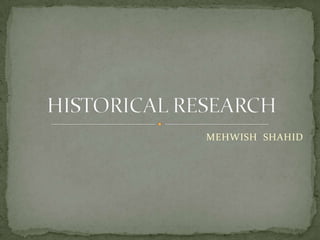
Historical research
- 2. Definition Purpose Steps involved Sources of historical research topics Type of information used in Historical Research Synthesizing material and preparing the narrative report Methodological Problems
- 3. Historical research is a type of research that examines past events or combinations of event to arrive at an account of what has happened in the past.
- 4. To uncover the unknown, To answer questions, To identify the relationship that the past has to the present, To record and evaluate accomplishments of individuals, agencies, or institutions, To aid in understanding the culture in which we live.
- 5. Here are the five steps involved in conducting Historical Research 1.Identification of the research topic and formulation of the research problem or question. 2. Data collection or literature review 3. Evaluation of materials 4. Data synthesis 5. Report preparation or preparation of the narrative exposition
- 6. Sources may be as follow: o Current issues in education o impact of a specific individual, an institution, or a social movement on an educational policy or educational reform o Desire to understand the relationship among different events o Desire to understand the historical roots of an educational policy o You may even decide that past events have not been presented accurately so you decide to write up your new interpretation (which must be based on some evidence).
- 7. Information in documents, records, photographs, relics, and interviews is used, Documents and records include, for example, written or printed materials such as diaries newspapers, reports, files, attendance records etc. Oral histories is another very useful type of information. An oral history is what you obtain when you interview a person who has had direct or indirect experience with or knowledge of the chosen topic. Relics are also used and include, for example, articles of clothing, buildings, books, architectural plans, desks, or any other object that might provide useful information about the past.
- 8. Synthesis is the selection, organization, and analysis of the materials collected. The materials must have met the tests of internal criticism (refers to the reliability or accuracy of the information contained in the source) and external criticism (refers to the validity, trustworthiness, or authenticity of the source).
- 9. During data synthesis and report preparation, the researcher must be careful to avoid the following four methodological problems: 1. Confusing correlation and causation. 2. Defining and interpreting key words, terms, and phrases (i.e., the issues of vagueness and presentism must be addressed). 3. Differentiating between evidence indicating how people should behave and evidence indicating how they did in fact behave.
- 10. 4. Maintaining a distinction between intent and consequences. This can be difficult because the events took place in the past. You cannot assume that the consequences observed in the past were necessarily intended by the historical actors.
- 11. THANK YOU
